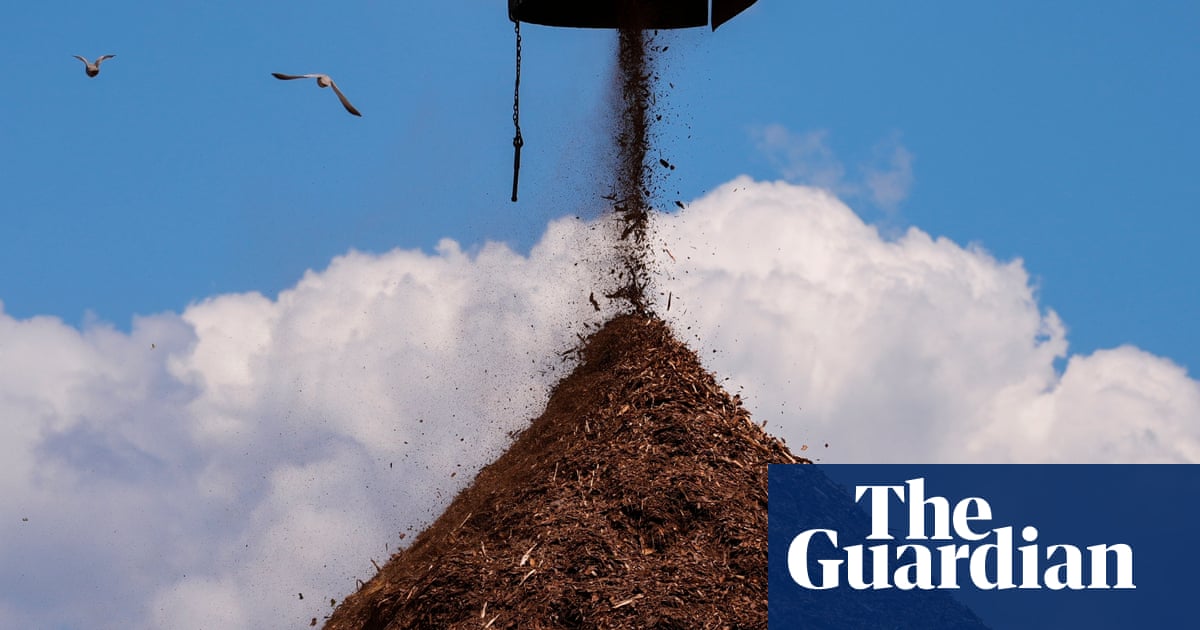A plan by the British government to burn biomass imported from countries including North Korea and Afghanistan has been described as “bonkers”, with critics saying it undermines the credibility of the UK’s climate strategy.
A bioenergy resource model, published in late summer, calculates that only a big expansion in the import of energy crops and wood from a surprising list of nations would satisfy the UK’s plan to meet net zero.
The government wants biomass to play a “significant role” in decarbonising all sectors of the economy in the years leading up to 2050, and has provided more than £20bn to businesses using it in the power and heat sectors over the past two decades.
About a third of the biomass used in the UK is imported. In 2021, 9.1m tonnes of wood pellets for use in energy production came from abroad – about 76% from North America and 18% from the EU. But there is not enough wood in these regions to supply the large expansion in bioenergy that the government is banking on.
The resource model sets out potential domestic and overseas sources of bioenergy. Only the most ambitious scenario outlined in the document would theoretically provide enough biomass to meet this demand, and it involves a huge increase in imports.
According to an assessment by Mary Booth, director of the Partnership for Policy Integrity, this includes a list of countries that seem “improbable” as sources of significant volumes of agricultural and forestry biomass, including North Korea, Afghanistan, Bhutan and the Maldives.
Booth criticised the way the model addresses changes in land use, and its assumption that energy crop area will increase exponentially globally and crop yields will increase by more than 50%. “This is all against a background of increasing climate change when whole regions are facing famine due to weather-induced crop failures,” she said. “It’s bonkers.”
As well as being unclear whether such a large volume of biomass would be available to the UK, the model does not attempt to explain how existing deforestation problems in countries such as Brazil or the lack of transparency in a dictatorship such as North Korea would comply with sustainability rules.
More fundamentally, Booth questioned the model’s assumption that bioenergy can actually limit greenhouse gas emissions.
Scientists and environmental campaigners have long disputed claims that burning wood for energy is climate neutral, saying forests are unlikely to be replaced quickly enough to absorb the carbon emissions required to slow the climate crisis. A recent report showed that Drax, the UK’s largest power station, was responsible for four times more carbon emissions than the country’s last remaining coal-fired plant which closed last month.
Critics also question the government’s reliance on extensive use of carbon capture and storage to neutralise emissions from burning biomass. Drax’s operator plans to develop a “bioenergy with carbon capture and storage” project using more government subsidies, but there are no such plants functioning with such systems in the world.
The former energy secretary Kwasi Kwarteng has also said importing wood to burn did not “make any sense”.
Furthermore, serious concerns have been raised about the affect of large-scale use of biomass on biodiversity, air quality, agriculture and soil health in the UK and abroad, as well as the potential for violation of Indigenous people’s land rights.
The government recognises some of these concerns. In a biomass strategy published last year it said only biomass use that complied with strict criteria was considered to be low carbon and to offer genuine CO2 emissions savings, and that it was considering strengthening these criteria.
But in January, a National Audit Office (NAO) report concluded that the government could not show its current arrangements were adequate to give it confidence that the industry was meeting sustainability standards.
after newsletter promotion
Several months later, Drax agreed to pay £25m after the energy industry regulator Ofgem found it had submitted inaccurate data on the sourcing of wood pellets from Canada.
A spokesperson for the Department of Energy Security and Net Zero (DESNZ) said the Intergovernmental Panel on Climate Change (IPCC) “is clear that biomass sourced in line with strict sustainability criteria can be used as a low carbon source of energy. We will continue to monitor biomass electricity generation to ensure it meets required standards.”
However, the IPCC itself says biomass should not automatically be considered “even in cases where the biomass is thought to be produced sustainably”.
DESNZ said it planned to consult on developing a “cross-sector sustainability framework” but would make no further comment because the biomass strategy and bioenergy resource model were subject to continuing litigation.
The rewilding charity the Lifescape Project, backed by the Partnership for Policy Integrity, has launched a legal case claiming the biomass strategy was illegal and would undermine the UK’s ability to achieve net zero by 2050.
Frances Lawson, a lawyer at Lifescape, said the strategy hanged on the resource model, which strengthened her organisation’s argument that the government’s wider approach to bioenergy was “irrational”.
Booth said the UK had backed itself into a corner by putting so much reliance on biomass in its plans to tackle the climate crisis. “They’re afraid to say the truth – that we all need to use a lot less energy,” she said.
The NAO said that if biomass could make the contribution to achieving net zero that the government expected, it may need to increase activity in other areas to reach its 2050 target. “This could include increasing the capacity of other types of greenhouse gas removal technology, encouraging greater behaviour change, or further innovation.”

